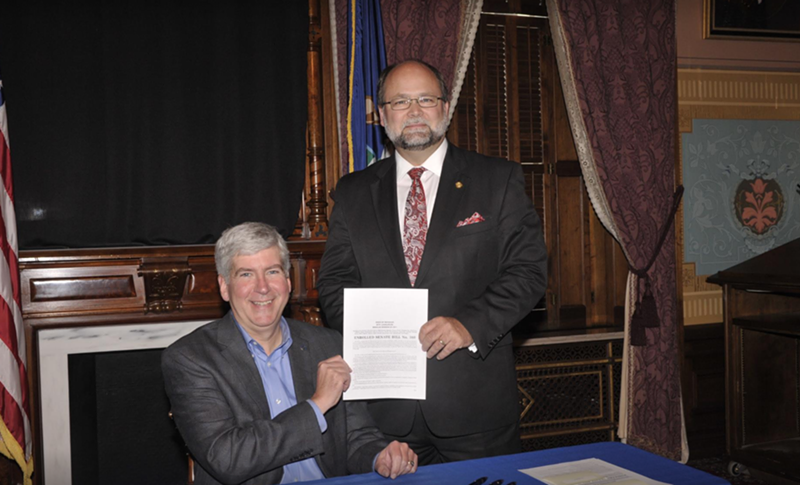
Arlan Meekhof/Facebook
Former GOP Senate Majority Leader Alan Meekhof and Rick Snyder, who orchestrated the 2018 lame duck power grabs.
The Michigan Supreme Court will hear oral arguments on the constitutionality of two of the GOP-controlled Legislature's more controversial lame duck moves — gutting citizen-initiated minimum wage and paid sick leave laws.
However, the court has only asked interested parties to file legal briefings ahead of oral arguments scheduled for July 17, and it still may not issue an opinion on the cases.
Two groups collected over 400,000 signatures each to put the proposed measures in front of voters in the November election. But the GOP-controlled Legislature instead made the initiatives law in September while ensuring that they wouldn't go into effect until March. The Legislature then voted along party lines during December's lame duck session to gut the laws. The new controversial minimum wage and paid sick time laws took effect last week.
Mark Brewer, an attorney and former head of the Michigan Democratic Party, is representing the citizen-led groups that organized the ballot proposals. Brewer previously pointed to a 1964 opinion by then-attorney general Frank Kelley that states that changes to citizen-initiated laws cannot take place in the same legislative session.
In other words, the Constitution says the GOP can't in December change laws that were approved in September.
The rule that gives the Legislature the ability to make a ballot initiative law was included in the 1963 Michigan Constitution. In response to a legislator’s question in 1964 about the new constitution, Kelley wrote that the legislature could not amend an adopted initiative law in the same legislative session, as the GOP eventually did in 2018.
The minimum wage law would have increased the state's meager $9.25 per hour minimum wage to $12 per hour by 2022, and included a $12 per hour minimum for tipped employees. The Republican changes slow the increase to $12.05 per hour by 2030, and caps the increase for tipped workers at $4.58 per hour.
Adjusted for inflation, the new minimum wage increase could end up being a pay cut for the state's lowest earners.
The paid sick time law would have required employers to provide 72 hours of sick time annually, or nine days, while allowing one hour of sick time accrual for every 30 hours worked. The Republican amendment reduced the number of sick days to four and exempts businesses with fewer than 50 employees, which represent about 1 million of the state's roughly 4.2 million workers. It also requires employees to work 40 hours to earn one hour of medical leave.
Danielle Atkinson, co-chair of MI Time to Care, the group that organized the paid sick time initiative, noted that "hundreds of thousands of people signed a petition to enact the law via the ballot."
"We believe the last Legislature failed to follow the Michigan Constitution, and hope the Michigan Supreme Court agrees with us and the longstanding opinion issued by former Attorney General Frank Kelley," she said in a statement.
Stay on top of Detroit news and views. Sign up for our weekly issue newsletter delivered each Wednesday.







